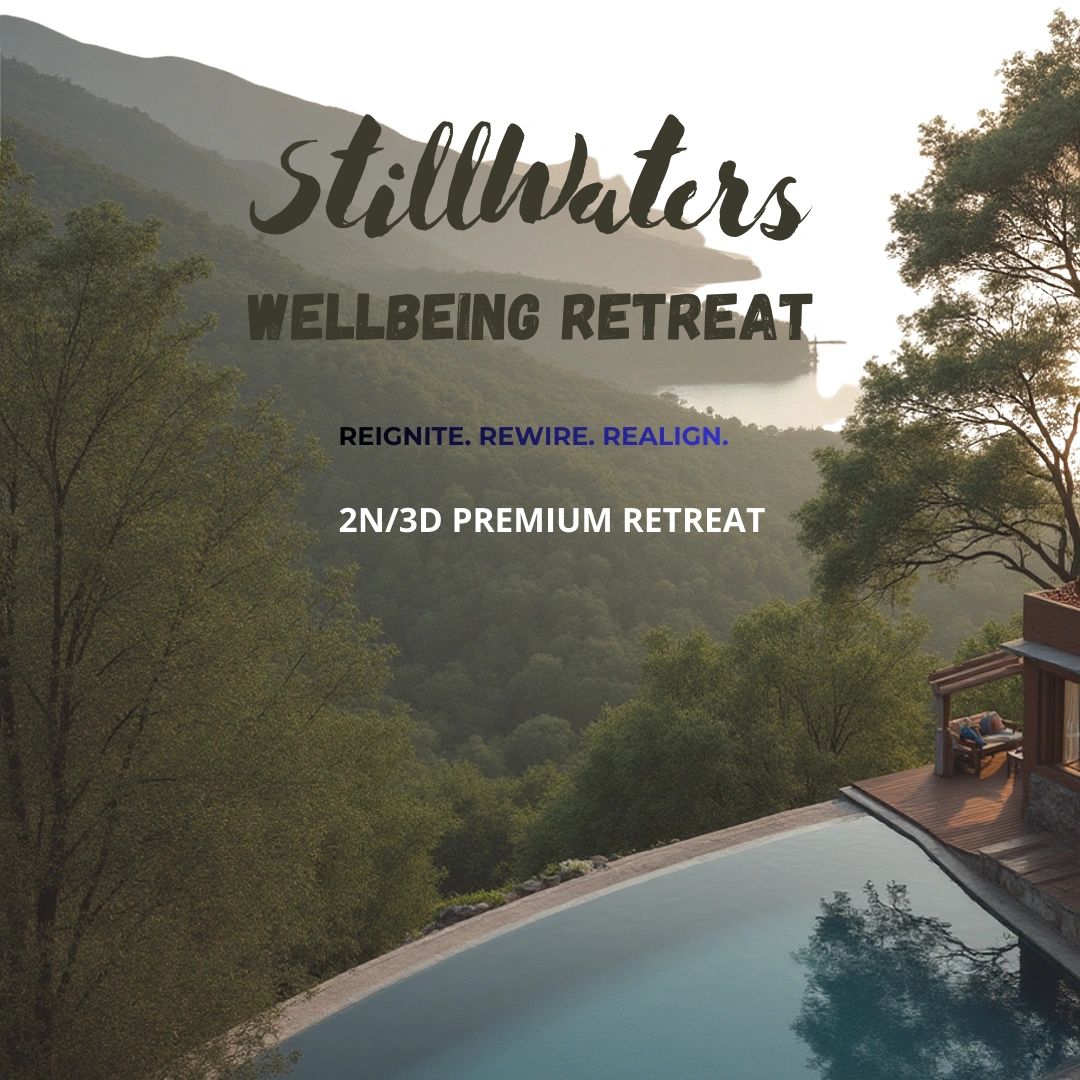Signed in as:
filler@godaddy.com
Signed in as:
filler@godaddy.com

Dr Johnsey Thoma
More than a retreat, Stillwater’s is a sanctuary — a sacred pause for the high-performers, visionaries, and change-makers who carry the weight of teams, organizations, and expectations. It is a space designed to reset the nervous system, reawaken joy, and realign with purpose — not through escape, but through conscious immersion in healing, clarity, and presence.
Its transformative days in a luxurious, nature-wrapped setting; the Stillwater’sexperience blends ancient wisdom and cutting-edge science. Our sessions flow from somatic healing to mindful leadership, from plant-based nourishment to neuroscience-backed productivity, from laughter and breath work to stillness and silence. This is a rare integration of mindfulness, psychology, movement, nutrition, nature therapy, and emotional intelligence — curated by world-class facilitators.
Stillwaters Holistic Wellbeing Retreat was designed to address this at the root. Not as a perk, not as an HR checkbox — but as a strategic intervention. A sanctuary where high-performers, CXOs, visionaries, and changemakers come to do what the corporate world rarely allows: pause, process, and realign.
To regenerate human energy through purpose-driven pauses that support emotional agility, physical renewal, and mental clarity.
“We don’t just help people recharge — we help them rewire.”
A Transformative 3-Day Journey
From Friday morning to Sunday evening, participants will go on a meticulously designed wellness journey — blending immersive workshops, embodied practices, group sharing, and silent reflection.
Sessions Include:
Outcomes:
Boosts Productivity: Healthy, focused employees deliver up to 21% higher output (Harvard Business Review).
Reduces Absenteeism: Wellness programs lead to 28% fewer sick days and medical leave.
Enhances Retention: Companies with wellness strategies report 67% lower turnover and stronger team loyalty.
Drives Engagement: Supported employees are more committed, creative, and collaborative.
Improves Mental Health Outcomes: Proactive support reduces anxiety, emotional fatigue, and burnout.
Attracts Top Talent: A reputation for caring boosts employer branding — especially among Millennials and Gen Z.
Lowers Long-Term Health Costs: Reduces claims, chronic conditions, and healthcare expenses.
Strengthens Team Culture: Wellbeing enhances psychological safety, empathy, and conflict resolution.
Delivers Strong ROI: Every ₹1 invested yields a ₹3–₹5 return in performance, savings, and retention (WEF).
Future-Proofs Organizations: Wellbeing is now critical to ESG metrics, talent strategy, and leadership resilience.
Meet the curators of your inner transformation:
Each brings decades of expertise and a deep understanding of human transformation.
Founded Dr. Johnsey Thomas, With over two decades of global experience, —also known as WellbeingWithDrJohn—is a visionary in corporate mental health and emotional culture. As a psychologist, DEI advocate, and executive advisor, he has helped transform workplace wellbeing across industries. Stillwater’s is his mission in motion: a sanctuary where high-performing professionals can pause, heal, and lead from clarity—not burnout. Stillwater’s was envisioned as a new-age sanctuary where world-class wellbeing meets five-star comfort, and ancient wisdom is fused with modern neuroscience.
A 4-5 star nature-wrapped resort, carefully selected for tranquility, comfort, and elegance. Located within drivable distance from a major city.
Features:
Minimum Booking Requirement: 50 participants
Includes:
“Stillwaters changed how I show up at work and at home. I feel more centered than I have in years.” — Senior VP, Tech MNC
“This isn’t just a retreat. It’s a blueprint for how we should live.” — HR Leader, Pharma
“I sent my entire leadership team. Our culture has never felt stronger.” — CEO, Logistics
“psychologist who understands me” “experienced psychologist in Hyderabad”
“trusted mental health expert” “psychologist for anxiety / relationships / exam stress / burnout”
psychologist in India, best psychologist in India, mental health clinic India, online psychologist India, therapy for anxiety, depression, counseling, stress management therapy, trauma therapy India, mental health support, online counselling psychologist
licensed psychologist India professional mental health care therapy for adults, emotional wellbeing therapy, clinical psychologist consultation, evidence-based therapy, confidential Counseling services, psychotherapy services India, mental wellness clinic when should I see a psychologist signs I need therapy how therapy helps anxiety and epression online therapy for working professionals best psychologist for anxiety in India depression therapy without medication stress and burnout counseling confidential nline counseling India mental health help near me psychologist near me psychologist in [Hyderabad] mental health clinic near me Counseling Services in [Hyderabad] best psychologist in [Hyderabad] mental health awareness benefits of therapy emotional regulation techniques coping with Stress and anxiety therapy myths and facts self-growth through therapy mental health in India #MentalHealth #MentalWellbeing #TherapyWorks #Psychology #MentalHealthMatters #EmotionalWellbeing #PsychologistIndia #MentalHealthIndia #OnlineTherapyIndia #CounselingIndia #IndianPsychologist #AnxietySupport #DepressionRecovery #StressManagement #TraumaHealing #EmotionalHealth #BurnoutRecovery #MentalHealthAtWork #WorkplaceWellbeing #LeadershipWellbeing #PersonalGrowth #ResilientMind “Why do I feel stuck in life?” “I feel anxious but don’t know why
“Therapy that actually works” “Psychologist who understands me” “Is therapy right for me?”
#PsychologistHyderabad #BestPsychologistHyderabad #ClinicalPsychologist #MentalHealthHyderabad #TherapyThatHeals #AnxietyRelief #DepressionSupport #StressManagement #OverthinkingHelp #OCDTreatment #TraumaTherapy #EMDRTherapy #CBTIndia #MindfulnessTherapy #RelationshipCounseling #MarriageCounselingHyderabad #ChildPsychologist #TeenCounseling #ADHDAwareness #LearningDisabilityAssessment #PsychologicalAssessment #OnlineTherapyIndia #MentalWellbeing #HolisticWellbeing #WellbeingWithDrJohn #ThePsychologistClinic #CorporateWellbeing #EmployeeWellness #MentalHealthAtWork #HealingBeginsHere